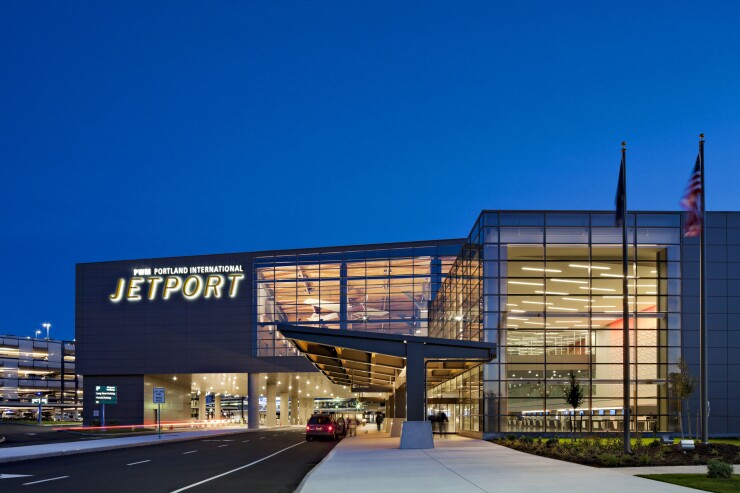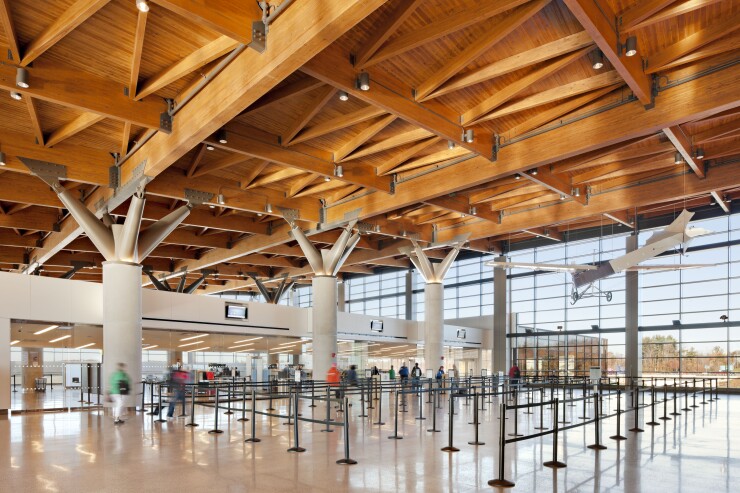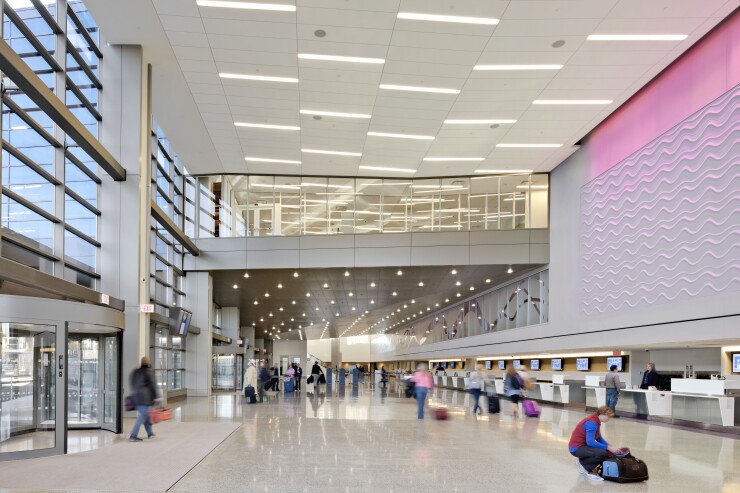The city of Portland, Maine, is issuing its very first green bond deal and the first-ever airport green bond deal.
The Portland Jetport is scheduled to sell $56.37 million of general airport refunding revenue non-AMT green bonds, expected to mature serially from 2021 through 2040 on Nov. 19.

“Maine individuals like to invest in their projects and they generally care about the environment so this fits the bill as a unique financing as the believed to be first ever revenue green bond issue for an airport,” said Michael Lexton, head of the Public Finance Transportation Group at UBS Global Wealth Management. “We think for the reasons stated above, this bond issue will stand out in the crowded supply next week and to top it off, the Jetport was recently upgraded by S&P.”
This financing will be a current refunding from the original bond issue which took place back in 2010 when the project was finished when it was deemed LEED gold certification making it only the second airport terminal in the country along with San Francisco International Airport’s Terminal 2 to achieve a LEED gold status.
“The Orlando airport got green evaluations but we are hoping there will be more proactive marketing airport debt as green debt, so a marketplace for green investor will build and grow, ultimately leading to a pricing benefit from issuing green bonds,” said Chris Bergstrom, executive director of the Public Finance Transportation Group at UBS Global Wealth Management.
The issuer is not using a third-party verifier for this deal and it's well-known that the other big sticking point when it comes to green bonds in this industry is there is no universally accepted definition of what makes a bond "green."
“I think the investors make their own green bond criteria and decide if a specific deal meets their criteria or not, although there are third parties such as LEED to officially designate a project as green,” Lexton said.
Bergstrom added that he doesn’t think there will ever be a static standard or definition for what is green.
S&P Global Ratings raised its long-term rating on Portland, Maine's general airport revenue bonds outstanding, issued for Portland International Jetport, to 'A-' from 'BBB+'. The outlook is stable.
S&P Global Ratings separately evaluated and scored the Terminal Project as “Green Bonds." The project, completed in 2012, achieved U.S. Green Building Council Leadership in Energy and Environmental Design Gold Certification. The 2019 transaction achieves an overall Green Evaluation score of E2/66, which is the second-strongest Green Evaluation score on our scale of E1 (highest) to E4 (lowest). About 29% of project costs fall within the scope of S&P's Green Evaluation.
“There is no pricing advantage yet but it is a catch 22 — there is not enough supply for there to be enough of an investor base interested in green bonds to make an issuer receive a pricing benefit and issuers are not issuing enough green bonds because there is no pricing benefit,” Bergstrom said. “This is a good opportunity to leverage the work done for the LEED certification and grow an audience for Green Bonds in the airport asset class.”
“Climate change is a fluid situation and the challenges with climate change will be evolving,” Bergstrom said.
The jetport in Portland is very unique and is taking sustainability another step further in a few different ways. First off, during the original project the floors were made with polished concrete made from local aggregate not imported terrazzo and the ceilings from sustainable harvested wood. The terminal is also geothermally heated and cooled.
“When we first started the terminal expansion in 2008 — it was an interesting albeit chaotic time due to the financial crisis. The financial turmoil did provide dramatically lower construction costs,” said Paul Bradbury, airport director, Portland International Jetport. “At the start of the project our goal was LEED silver, but through the efforts of the team we were able to exceed our goal and achieved LEED gold status for the terminal expansion project. This was only the second airport terminal in the country to achieve this level. Back then, there were no such things as green bonds but now times have changed and we are pleased to be able to issue green bonds for this upcoming current refunding,”

The Jetport also has been re-manufacturing aircraft deicing fluid (ADF) from used ADF effluent captured from the aircraft deicing pad. The jetport is the first airport in the country to produce a new FAA-approved ADF from used recycled fluid. The Jetport also receives and processes used fluid from other airports which it remanufactures and sells to other airports in the region.
“We want to recycle as much as we can and add more value to the end product,” Bradbury said. “By producing and selling the captured and remanufactured fluid at the end of our process, we are staying competitive with other aircraft deicing fluid processing alternatives. That is business nirvana, when you can help the environment and stay competitive with the other processing options.”
The Jetport saw record growth this past fiscal year, as it was up 14.2% and the original project a decade ago, allowed the jetport to handle the growth it has seen.
“Green bonds are a new way of looking at projects and here in Portland we are out in front on this. We are selling only one product, transportation to and from Portland, Maine. I believe these travelers, our customers, appreciate the fact that the jetport is taking its environmental impact seriously, and will be more likely to choose the Jetport for their air travel needs,” Bradbury said.

The purpose of labeling the bonds as Green Bonds is to allow purchasers to invest directly in projects that finance environmentally beneficial purposes. The holders of the bonds do not assume any specific project risk or economic benefit related to any of the funded projects as a result of the Green Bonds designation.
“You have to invest in your product in order to meet and satisfy your customers' expectations. I look forward to a successful issuance. Who would have thought that 10 years out, we would have such a favorable low-rate environment to support our terminal project,” Bradbury said.
He added that sustainability has been a focus of the city of Portland, and the Jetport’s Capital Improvement Program for the past 10 years.
“I am pleased to have this Bond designated as a Green Bond,” Bradbury said. “This is a first for the airport industry, and is in line with our mission to be an environmentally conscious gateway.”





